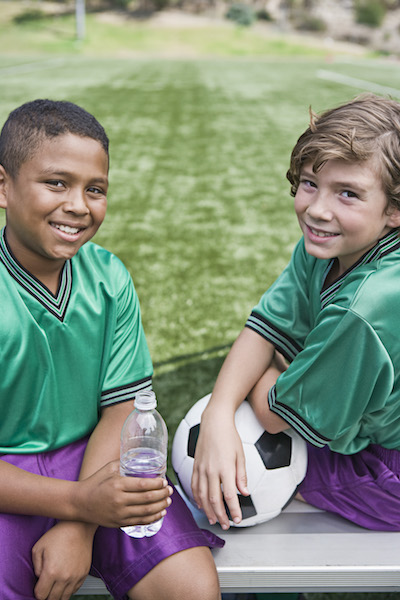View All Articles
 If you answered these questions in the affirmative, perhaps your child would benefit from a sports drink during their activity. Otherwise, water is always the best choice when your child is looking for a refreshing beverage.
If you answered these questions in the affirmative, perhaps your child would benefit from a sports drink during their activity. Otherwise, water is always the best choice when your child is looking for a refreshing beverage.
Rethink the drink! Sports drinks aren't as healthy as parents think they are.
During the school year I teach a 6-week nutrition class to a group of middle school students. One of my most popular topics is about sugary drinks. The number of jaw drops I get when each student discovers how much sugar is in their favorite drink makes this lecture fun to teach. Surprisingly many kids consider sports drinks a healthy choice that contains very little or no added sugar. Kids are shocked to know that a bottle of their favorite sports drink often has more sugar than a candy bar, cookie, or a slice of cake!
Until the students break down popular sports drink commercials, they are unaware that these drinks are meant to be consumed during intense exercise. My goal is to get students to rethink their drink and improve their sugary drink knowledge.
When are sports drinks a good idea?
Sports drinks are flavored beverages that contain carbohydrates (sugar), electrolytes, coloring and sometimes other vitamins and nutrients. These drinks are marketed to kids for a wide variety of reasons, and often claim to improve athletic performance, provide the body with lasting energy, and prevent dehydration. These claims are often very eye-catching to kids, which can make it a challenge to educate them on their appropriate use.
Kids who are active for more than 60 minutes in a high intensity sport (such as long-distance running, football, basketball, soccer, etc.) would likely benefit from sports drinks. Sports drinks help provide needed carbohydrates for quick energy and to replace water and electrolytes lost from sweat during exercise. They can be helpful for people who are very active, but for most kids sports drinks are not needed.
Sports drinks are just like any other sugary drink such as soda, juice, or flavored beverage; they contain a lot of sugar and calories. When kids are active, they are able to use up those calories quickly for energy but drinking them without being active can cause unwanted weight gain and cavities.
Before handing your kid a sports drink, ask yourself these questions:
1). Will they be active outside? If yes, is it hot and humid?
2). Will they be active for more than 60 minutes?
3). Will my child be doing an intense activity like long-distance running, football, basketball, soccer, etc.?
 If you answered these questions in the affirmative, perhaps your child would benefit from a sports drink during their activity. Otherwise, water is always the best choice when your child is looking for a refreshing beverage.
If you answered these questions in the affirmative, perhaps your child would benefit from a sports drink during their activity. Otherwise, water is always the best choice when your child is looking for a refreshing beverage.
If you’re still not convinced that sports drinks should be consumed with caution, let me leave you with this fun fact: One 20 oz. sports drink has 34 grams of sugar, which is 8.5 teaspoons of sugar. This is more than a full sized candy bar, which has 7.5 teaspoons of sugar!!!
Unless your child is participating in an intense athletic endeavor, offer them some good old-fashioned H2O, and leave the sports drinks on the shelves.







